| Listing 1 - 10 of 13 | << page >> |
Sort by
|
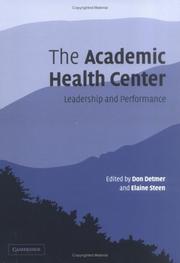
ISBN: 1107147190 1280149442 9786610149445 0511198698 0511122012 0511113331 0511299575 0511543484 0511112823 0521827183 1107405076 Year: 2005 Publisher: Cambridge, UK ; New York : Cambridge University Press,
Abstract | Keywords | Export | Availability | Bookmark
 Loading...
Loading...Choose an application
- Reference Manager
- EndNote
- RefWorks (Direct export to RefWorks)
The leadership and management of academic health centers present challenges as complex as any in the corporate environment. A consensus is emerging about their integrated mission of education, research and service, and this book, first published in 2005 and focusing on value-driven management, provides a truly comprehensive review of these issues available. Based on reports produced by the Blue Ridge Academic Health Group, which has developed a framework for meeting the challenges of improving health in the 21st century, it also contains invited commentaries and case studies from leading authorities in and beyond the United States. It identifies the public policies and organizational practices required to maximise the health status of individuals and the population, and highlights innovative practices. It is essential reading for managers and leaders of clinical and basic science departments in academic health centers, and for all those involved in health systems management studies.
Academic medical centers --- Academic health centers --- University medical centers --- Medical centers --- Universities and colleges --- Administration. --- Health Sciences --- General and Others
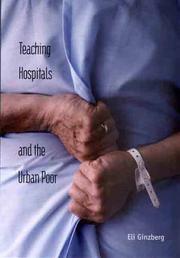
ISBN: 1281731226 9786611731229 0300133014 9780300133011 9781281731227 9780300082326 0300082320 Year: 2000 Publisher: New Haven Yale University Press
Abstract | Keywords | Export | Availability | Bookmark
 Loading...
Loading...Choose an application
- Reference Manager
- EndNote
- RefWorks (Direct export to RefWorks)
Academic health centers (AHCs) have played a key role in propelling the United States to world leadership in technological advances in medicine. At the same time, however, many of these urban-based hospitals have largely ignored the medical care of their poor neighbors. Now one of the leading experts in American health policy and economics ponders whether current and proposed changes in the financing and delivery of medical care will result in a realignment between AHCs and the poor. Basing his discussion on an analysis of the nation's twenty-five leading research-oriented health centers, Eli Ginzberg and his associates trace the history of AHCs in the twentieth century. He claims that AHCs are once again moving toward treating the poor because these hospitals need to admit more Medicaid patients to fill their empty beds, and their medical students need opportunities to practice in ambulatory sites. He also assesses some of the more important trends that may challenge the AHCs, including financial concerns, changing medical practice environments, and the likelihood of some form of universal health insurance. Eli Ginzberg is director of The Eisenhower Center for Conservation of Human Resources, Columbia University. He has been a consultant to nine U.S. presidents and chaired the National Commission for Employment Policy for six presidents. He is the author of numerous books as well as articles on health affairs in the New England Journal of Medicine, the Journal of the American Medical Association, and many other journals.
Academic medical centers --- Urban poor --- City dwellers --- Poor --- Academic health centers --- University medical centers --- Medical centers --- Universities and colleges --- Medical care
Book
ISBN: 1447147359 1447147367 Year: 2014 Publisher: London : Springer London : Imprint: Springer,
Abstract | Keywords | Export | Availability | Bookmark
 Loading...
Loading...Choose an application
- Reference Manager
- EndNote
- RefWorks (Direct export to RefWorks)
This comprehensive book teaches the theories and concepts behind leadership and explains the skills and traits needed to become a good leader. The authors discuss practical management skills, including conflict resolution techniques, how to manage difficult personalities and how to effectively manage up. The readers will learn to build and motivate a team, understand personality types and how to manage to their strengths. Success in Academic Surgery: Leadership in surgery is a highly useful book to anyone in the surgical field, providing clear examples and useful tips for what to do in the role of a surgical leader from current leaders in surgery.
Surgery --- Academic medical centers. --- Vocational guidance. --- Practice. --- Academic health centers --- University medical centers --- Surgery as a profession --- Medicine. --- Surgery. --- Medical education. --- Medicine & Public Health. --- Medicine/Public Health, general. --- Medical Education. --- Medical centers --- Universities and colleges --- Medical personnel --- Professional education --- Surgery, Primitive --- Medicine --- Clinical sciences --- Medical profession --- Human biology --- Life sciences --- Medical sciences --- Pathology --- Physicians --- Education --- Health Workforce
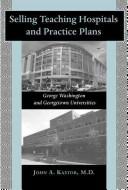
ISBN: 0801897092 9780801897092 9780801888113 0801888115 Year: 2008 Publisher: Baltimore Johns Hopkins University Press
Abstract | Keywords | Export | Availability | Bookmark
 Loading...
Loading...Choose an application
- Reference Manager
- EndNote
- RefWorks (Direct export to RefWorks)
For the current leaders of medical schools facing similar financial challenges, Kastor analyzes how much it costs to teach clinical medicine and offers valuable advice on how to reduce expenses and increase surpluses.
Practice Management --- Hospital Restructuring --- Financial Management --- Academic Medical Centers --- Hospitals --- Academic medical centers --- Teaching hospitals --- Academic health centers --- University medical centers --- Medical centers --- Universities and colleges --- Hospitals, Teaching --- Health occupations schools --- Benevolent institutions --- Infirmaries --- Health facilities --- organization & administration --- Ownership --- Administration. --- Finance. --- Georgetown University. --- George Washington University. --- Georgetown University Medical Center --- GUMC --- G.U.M.C.
Book
ISBN: 9029530650 Year: 1999 Publisher: Amsterdam Arbeiderspers
Abstract | Keywords | Export | Availability | Bookmark
 Loading...
Loading...Choose an application
- Reference Manager
- EndNote
- RefWorks (Direct export to RefWorks)
History of human medicine --- Amsterdam --- 378.4 <492 AMSTERDAM> --- Universiteiten--Nederland--AMSTERDAM --- Academic medical centers --- Medical education --- History of medicine --- History. --- 17th century --- 18th century --- 19th century --- 20th century --- Netherlands --- 17th century. --- 18th century. --- 19th century. --- 20th century. --- Netherlands. --- 378.4 <492 AMSTERDAM> Universiteiten--Nederland--AMSTERDAM --- History --- Medical personnel --- Professional education --- Academic health centers --- University medical centers --- Medical centers --- Universities and colleges --- Education --- Universiteit van Amsterdam. --- AMC --- A.M.C. --- Amsterdam UMC (Hospital consortium). --- Amsterdam UMC (Hospital consortium)
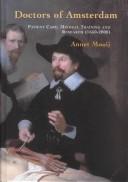
ISBN: 9053564950 9053564705 Year: 2002 Publisher: Amsterdam Amsterdam university press
Abstract | Keywords | Export | Availability | Bookmark
 Loading...
Loading...Choose an application
- Reference Manager
- EndNote
- RefWorks (Direct export to RefWorks)
Academic medical centers --- Medical education --- Delivery of Health Care --- Education, Medical --- Physicians --- Research --- Dissertations --- History of medicine --- Patient care --- History. --- history. --- 17th century --- 20th century --- Netherlands --- Nursing --- Dissertations. --- 17th century. --- 20th century. --- Netherlands. --- Nursing. --- History --- Medical personnel --- Professional education --- Academic health centers --- University medical centers --- Medical centers --- Universities and colleges --- Education --- Universiteit van Amsterdam. --- AMC --- A.M.C. --- Amsterdam UMC (Hospital consortium). --- Amsterdam UMC (Hospital consortium)
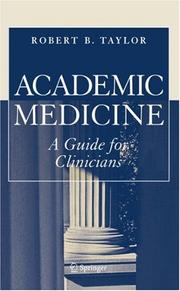
ISBN: 128074376X 9786610743766 0387344500 0387289569 Year: 2006 Publisher: New York, NY : Springer,
Abstract | Keywords | Export | Availability | Bookmark
 Loading...
Loading...Choose an application
- Reference Manager
- EndNote
- RefWorks (Direct export to RefWorks)
Robert B. Taylor, MD, has edited this book that introduces physicians and clinicians to an academic career in the health professions. Written from the clinician’s viewpoint, it guides readers who are considering or who have recently embarked upon such a career through the essentials. Taylor’s approach is practical and well rounded. He integrates evidence-based information from the medical literature with anecdotes from contributors noted for their success in a spectrum of disciplines at top academic medical centers. Taylor addresses the career decision-making process, job hunting, and life in academia. He also focuses on skills for success—from teaching to grant writing. Advice on clinical practice, career management, and the work/life balance is plentiful. The book dispels common myths and outlines errors to avoid. Differences in expectations and culture among teaching hospitals, medical schools, and academic medical centers are considered throughout. Sources for more information are provided as well.
Medical research personnel. --- Medical teaching personnel. --- Academic medical centers. --- Academic health centers --- University medical centers --- Medical centers --- Universities and colleges --- Medical educators --- Medical teachers --- Medical personnel --- Teachers --- Clinical investigators --- Medical researchers --- Medicine --- Research --- Family medicine. --- Medicine. --- Emergency medicine. --- General Practice / Family Medicine. --- Medicine/Public Health, general. --- Primary Care Medicine. --- Medicine, Emergency --- Critical care medicine --- Disaster medicine --- Medical emergencies --- Clinical sciences --- Medical profession --- Human biology --- Life sciences --- Medical sciences --- Pathology --- Physicians --- Family practice (Medicine) --- General practice (Medicine) --- Physicians (General practice) --- Health Workforce --- General practice (Medicine). --- Primary care (Medicine). --- Primary medical care --- Medical care
Book
ISBN: 0124059295 0124051987 1322576068 9780124059290 9780124051980 9780124051980 Year: 2015 Publisher: Amsterdam
Abstract | Keywords | Export | Availability | Bookmark
 Loading...
Loading...Choose an application
- Reference Manager
- EndNote
- RefWorks (Direct export to RefWorks)
Addresses complex issues with scientific research misconduct throughout the biomedical community by providing real life examples to underscore the serious nature of these misconduct issues, thereby motivating programs to provide appropriate corrective actions Highlights this complexity in 8 completely anonymous case studies, with full explication of details followed by a full dissection and discussion Reviews the current regulations and policies that guide the management of scientific integrity Concludes with a section authored by the Federal Court Judge with special expertise and interest
Medicine --- Academic medical centers --- Natural Science Disciplines --- Professional Misconduct --- Research --- Study Characteristics --- Health Facilities --- Morals --- Psychology, Social --- Disciplines and Occupations --- Health Care Facilities, Manpower, and Services --- Publication Characteristics --- Humanities --- Behavior and Behavior Mechanisms --- Health Care --- Psychiatry and Psychology --- Ethics --- Academic Medical Centers --- Biomedical Research --- Case Reports --- Scientific Misconduct --- Science --- Health & Biological Sciences --- Medical Research --- Corrupt practices --- Moral and ethical aspects --- Moral and ethical aspects. --- Corrupt practices. --- Academic health centers --- University medical centers --- Medical centers --- Universities and colleges --- Health Workforce --- United States. --- ORI --- National Institutes of Health (U.S.).
Book
ISBN: 3319212591 3319212605 Year: 2015 Publisher: Cham : Springer International Publishing : Imprint: Springer,
Abstract | Keywords | Export | Availability | Bookmark
 Loading...
Loading...Choose an application
- Reference Manager
- EndNote
- RefWorks (Direct export to RefWorks)
This compelling title is a comprehensive, practical guide for current and aspiring leaders in academic medical centers (AMC). Offering both a broad overview of the dynamics of the AMC and a detailed “how-to” set of instructions for the wide-ranging situations that demand skilled leadership, this expertly designed volume is filled with meaningful examples and insights. Learning to Lead in the Academic Medical Center: A Practical Guide consists of five parts. The first three sections are narrative and intended to help the reader become a better leader. The first section looks at the AMC as a social system and emphasizes an understanding of group dynamics. The second section discusses the critical role of personality, while the third covers all the necessary leadership skill sets such as negotiation, persuasion, conflict resolution, running a meeting, and so on. The fourth section is a fascinating series of case vignettes to solve based on the material that preceded it. The final section provides a set of highly instructional solutions to those cases. An indispensable reference authored by three highly accomplished leaders in the field, Learning to Lead in the Academic Medical Center: A Practical Guide will be of great interest to all physicians and trainees who seek a comprehensive yet handy resource on the need-to-know basics of success in the AMC environment.
Medical Professional Practice --- Medicine --- Health & Biological Sciences --- Health services administration. --- Academic medical centers. --- Leadership. --- Academic health centers --- University medical centers --- Health administration --- Health care administration --- Health care management --- Health sciences administration --- Health services management --- Medical care --- Administration --- Management --- Medicine. --- General practice (Medicine). --- Psychiatry. --- Surgery. --- Medicine & Public Health. --- General Practice / Family Medicine. --- Ability --- Command of troops --- Followership --- Medical centers --- Universities and colleges --- Health planning --- Public health administration --- Family medicine. --- Surgery, Primitive --- Medicine and psychology --- Mental health --- Psychology, Pathological --- Family practice (Medicine) --- General practice (Medicine) --- Physicians (General practice) --- Family medicine
Book
ISBN: 9401790663 9401790655 1322175411 9789401790659 Year: 2014 Publisher: Dordrecht : Springer Netherlands : Imprint: Springer,
Abstract | Keywords | Export | Availability | Bookmark
 Loading...
Loading...Choose an application
- Reference Manager
- EndNote
- RefWorks (Direct export to RefWorks)
Few faculty members in academic medical centers are formally prepared for their roles as teachers. This work is an introductory text designed to provide medical teachers with the core concepts of effective teaching practice and information about innovations for curriculum design, delivery and assessment. It offers brief, focused chapters with content that is assimilated easily by the reader. The topics are relevant to basic science and clinical teachers and the work does not presume readers possess prerequisite knowledge of education theory or instructional design. The authors emphasize the application of concepts to teaching practice. Topics include: Facilitating Student Learning; Teaching Large Groups; Teaching in Small Groups; Flipping the Classroom; Problem-Based Learning; Team-Based Learning; Teaching Clinical Skills; Teaching with Simulation; Teaching with Practicals and Labs; Teaching with Technological Tools; Teaching to Develop Scientific Engagement in Medical Students; Designing a Course; Establishing and Teaching Elective Courses; Designing Global Health Experiences; Assessing Student Performance; Documenting the Trajectory of Your Teaching and Teaching as Scholarship. This is a complete revision of the first edition of this work with new chapters and up to date information. Similar to the first edition, chapters were written by leaders in medical education and research who draw upon extensive professional experience and the literature on best practices i n education. Although designed for teachers, the work reflects a learner-centered perspective and emphasizes outcomes for student learning. The book is accessible and visually interesting and the work contains information that is current, but not time-sensitive. Each chapter concludes with references, many include recommendations for additional reading, and the work includes an appendix with resources for medical education.
Medicine --- Academic medical centers. --- Study and teaching. --- Medical education --- Academic health centers --- University medical centers --- Medical centers --- Universities and colleges --- Teaching --- Education, Medical. --- Academic Medical Centers. --- Curriculum. --- methods --- methods. --- Medicine. --- Medical Education. --- Biomedicine general. --- Medicine/Public Health, general. --- Education, general. --- Medical personnel --- Professional education --- Clinical sciences --- Medical profession --- Human biology --- Life sciences --- Medical sciences --- Pathology --- Physicians --- Education --- Health Workforce --- Medical education. --- Education. --- Biomedicine, general. --- Children --- Education, Primitive --- Education of children --- Human resource development --- Instruction --- Pedagogy --- Schooling --- Students --- Youth --- Civilization --- Learning and scholarship --- Mental discipline --- Schools --- Training --- Education, Medical --- Curriculum --- Teaching.
| Listing 1 - 10 of 13 | << page >> |
Sort by
|

 Search
Search Feedback
Feedback About UniCat
About UniCat  Help
Help News
News